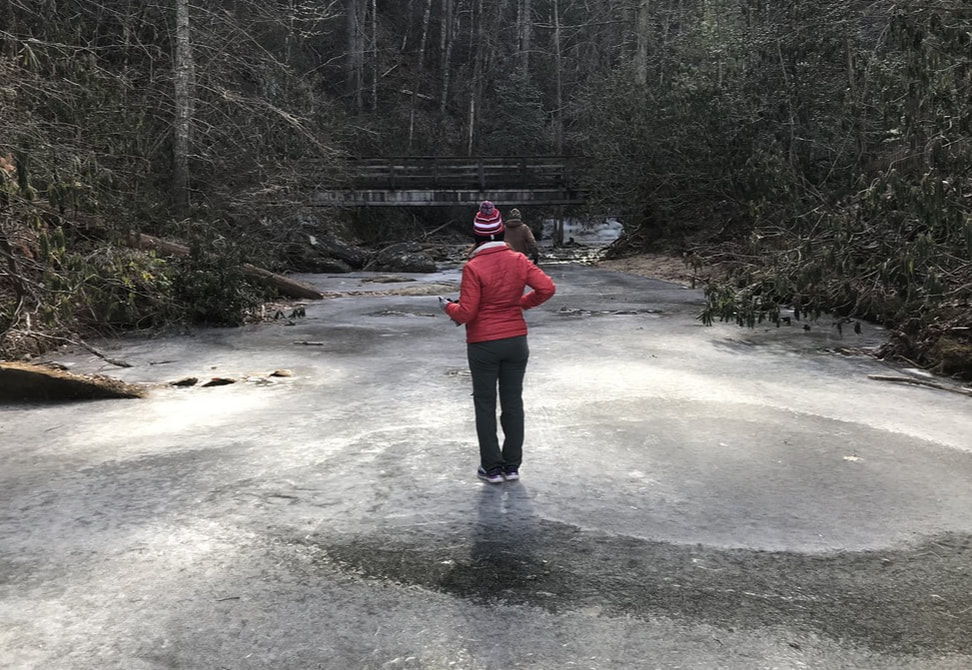|
Last week I was out on my morning run and stumbled across a huge branch on the trail. So I climbed over it and so gracefully got my foot stuck and fell down in the mud! So it had me thinking about having goals and visions then hitting an obstacle on my path and my own relationship with obstacles.
From time to time, we all have setbacks, blocks and obstacles on our path to achieving success and living the life of our dreams. We’re told that we just have to be determined, push harder, and strive to overcome these landmines. But does it ever feel like you’re forcing a square peg into a round hole? Like no matter how hard you try, you’re completely blocked? How I faced that branch on my path is typical of how I tackle roadblocks. I climb over them and push my way through them. Yes, my persistence does work sometimes and I reach my goal. I also sometimes fall down in the mud because I pushed too hard. I noticed the times that I stopped forcing and started allowing is when things really started to move for me. This doesn’t mean I don’t take action steps and face the obstacles presented, it’s simply done with less push, force and angst. Blocks can be a great teacher. If you pay close enough attention, you might just be able to create a breakthrough. Here are four ways that blocks can actually lead to success: 1. Blocks point out where things aren’t flowing for you. When you can’t write anymore, your inspiration is gone for the day. When you can’t run any longer, your muscles are exhausted. When you can’t think anymore, your productivity for that meeting plummets. Blocks pop up in areas of our life where energy just isn’t flowing. It warns us that something just isn’t working here and it’s time to take a break, or go a different route. Sometimes that pause can help you reconnect to what your vision is, and sometimes we realize the original goal no longer serves us. 2. It feels unnatural to you. Most blocks come about because we’re forcing something that was never a good fit to begin with. We’re trying to do things the way we’re told they’re supposed to be done or we’re trying to hide certain parts of our personality. So maybe traditional marketing isn’t your thing, but hosting fun parties is and focusing on connection is. Whatever the case, blocks point out when things feel unnatural and encourage us to be more authentic. 3. Sometimes the best way to get through a wall is just to walk around it. We can be so obsessed with an obstacle that we forget why we were trying to overcome it in the first place. Maybe you want a book deal because it will help you get more clients. If the book deal isn’t working, that doesn’t mean you’re doomed to never get more clients. Forget the obstacle and find a new path to your ultimate goal. Many times, obstacles point out that one tiny part of the plan isn’t working, not the whole thing. 4. Lack of resources teaches you how to be resourceful. When you’re unable to move forward, you have no choice but to get creative. The advantage of being pushed to the edge of the cliff is that we learn how to fly. Blocks teach us things about ourselves that we never thought possible and push us to blow our expectations out of the water. So the next time you come up to a block in your life, consider that maybe it’s there for a reason. Maybe it’s there to teach you what comes naturally to you or where things flow for you. Maybe it’s there to help you figure out just how much potential you really have inside. Maybe it’s there to help you stop taking on other people’s blueprints for success and start building your own. Once you realize what you can really accomplish, good luck to anything that tries to get in your way.
2 Comments
 If you are feeling blue in the winter, you're not alone! Lots of people feel a bit low as the days get darker and colder. But while many experience the winter blues, there are some who experience seasonal affective Disorder(SAD). SAD can be quite debilitating and can cause feelings of sadness, irritability, sluggishness, and eating and sleep disturbances. Although it's likely to be caused by multiple factors, seasonal affective disorder and winter blues have been closely linked to lessened exposure to light since the days get shorter and darker throughout fall and winter. This could lead to a cascade of physiological changes, including a disruption of the circadian rythyms, lower vitamin D feels, dysregulation of serotonin, and overproduction of melatonin. Couple this with post-holiday blues and a dislike of cold temperature, and you many find yourself begging for warmer, longer, sunnier days. 1) Notice Your Patterns As the fall sets in, I've made a habit to ask my clients about their mood patterns over the past several fall and winter seasons. Upon reflection, many people can start to recognize that their moods worsen during this time frames and this knowledge is powerful. It enables us to work proactively to structure their winters and plan ahead of time to combat their seasonal blues. 2) Rule out medical causes Haven't gotten around to that annual physical yet? Now might be a good time to visit your doctor. Various medical issues, including viral illnesses and endoncrinologial disorders such as thyroid disfunction, can disguise themselves as a low mood in the winter. A lack of certain vitamins can also contribute, as seen below. 3) Check your Vitamin D levels Low Vitamin D levels particular have been associated with depressive symptoms. Further, vitamin D levels notoriously drop during the wintry months. For this reason, many physicians will test your Vitamin D levels and may suggest vitamin D supplementation to help boost your mood during the winter. 4) Rethink the winter Reframing your thoughts about the wintertime can be quite powerful. Many people in the darkest, most northern cities view wintertime differently. It's often seen as a time that is cozy, a time for celebration and togetherness with loved ones. I look at winter as a period of rest for the spring, summer, and fall. 5) Soak up the natural light Exposure to natural light can help with low mood. Bundle up and try to get out of the house, even on cooler days, to get ample exposure to natural light. While in your house, open your shades to allow natural sunlight in. Perching yourself by those windows will give you a little boost from the natural light. 6) Create your own sunlight Lightboxes are widely recommended by physicians in the treatment of winter depression. Designed to mimic the sunlight, medical-grade lightboxes also come with UV filters that block out harmful UV rays that are damaging to the skin. A short but consistent 20-30 minute exposure to the light created by these light boxes every morning can be high effect with minimal side effects for most people. Since light boxes are not consistently regulated, it's important to seek out a physicians guidance when choosing one. 7) Connect with others As the winter wears on, many of us can feel like withdrawing from our social lives. While enjoying cozy time at home may protect us from braving the cold, it can also result in avoidant and isolating behaviors that can leave us feeling lonely and sad. Reaching out to our friends and make sure our social calendar remains active and fulfilling is a great way to combat those winter blues and help us feeling connected and supported. 8) Get moving Exercise is known to be protective for our mood, can lower levels of stress, and, for many of us, holds a strong association with mental and physical well-being. While exercising outsides gives you the dual benefit of natural-light exposure and physical activity, sometimes the weather can make that impossible. On those days, hitting the gym, and choosing equipment closer to the window is ideal. I love a warm yoga class on a cold day too! 9) Stay Structured Fight the urge to snooze in bed for that extra hour and instead opt to stick to your normal routine. Having regular sleep-wake times and sticking with your schedule can help structure your day, keeping you feel productive, and combat the sluggishness that often occurs with the winter blues. It can be tempting to sleep for longer hours during those darker days, research has shown that excessive sleep is neither medically or mentally healthy. 10) Self Compassion and Self-Care You may not be feeling on your A game right now, have compassion for where you are. What are some things you might need right now? A long hot bath? Catching up with a good book? Is there anything you can let go of right now to create space for yourself? Take time for you and what you need right now. 11) Stay away from certain foods Certain dietary choices are linked to an increased risk of seasonal affective disorder. Maintaining good health through eating balanced and nutritious meals is essential in protecting yourself against SAD. Specifically, SAD, is associated in increased carbohydrate cravings, so being mindful of carb intake and limiting refined sugar could help curb irritably along with eating anti-inflammatory foods can support good mental health at any time of the year. Drink alcohol moderately as it is a known depressant and can affect your mood, behaviors, and sleep cycles. Staying hydrated can be helpful too. 12) Seek professional help It might be one of the reasons above, but there could also be other explanations for low mood this time of year. The holidays can stir up difficult family dynamics or feelings of sadness that we are left to contend with after the busyness of the holiday season ends. It can be incredibly powerful and effective to seek a therapist's assistance in helping to explore and work through these emotions. While the above-mentioned tips are highly effective for most people, if you find yourself still struggling with your mood, it may be time to be evaluated by a physician or schedule an appointment with a licensed a licensed therapist. While the above information is helpful to know, it should not be taken for medical advice. Spring is coming shortly!! :)  Anytime we are stepping out of our comfort zone and trying for something, whether that be asking someone on a date, starting a new business, climbing mountains, changing jobs, etc., we are going to feel some degree of fear. Our minds want to keep us safe and it's easy to confuse the fear with whether we should take the next step or stay in our safe, comfort zone. I remember when I started my business(14 years ago this week!), I remember thinking: How risky is this? Is it worth it? Can I really make this happen? Do I have what it takes? I remember being super nervous and fearful, but excited too. Someone recently told me that I was fearless. No, I most definitely experience fear. I also spend a lot of my free time hiking, trail running and mountain biking. There have been big falls that created some fear when I did my sport again and there are times I've walked along a cliff and felt my heart race. I arrived in foreign countries and felt panic initially when I didn't speak the language. So what are the pros? Doing something I loved. Turning a passion into a career. Building my confidence when I faced my fears and did it anyway. The cons? Making mistakes. Taking on significant emotional and financial stress. Giving up a stable job. I may trip and fall down again and get hurt. Ultimately, I decided I couldn't live forever in fear of the cons. Yes, there are risks involved with owning a biz. Yes, I may fall again when I trail run or mountain bike. There could be a root I trip over, I may have a slow month in my business. I may still have fear but I don't dwell on those fears. Instead, I acknowledge my fears, but I don't let them be in the driver's seat of my decisions. I continue run my business and I won't stop climbing or running mountains. I created a mini road map of tools that helped me manage my fears of failure and to embrace risk. Whether you're starting your own company or trying to achieve another goal, these tips are highly relatable no matter what mountain you're trying to conquer: 1. Be honest with yourself Before embarking on a risky endeavor, assess your strengths and weaknesses. What are your necessary hard and soft skills to improve the likelihood of success? If you don't, how can you acquire them, or whom can you bring on board to help? 2. Commit to the endeavor Once you decide that you're equipped to take on the risk, commit and go for it. Wavering only increases fear and doubt. Don't look back. Stay focused on the end goal. You are more like to get what you want when you make a strong commitment to it. I love when I set out on a hike or a trail run, I have no choice but to find my way to the trail head. I can't quit or I will be stuck in the middle of the woods without food or water! 3. Stay grounded. As you barrel toward your goal, it's easy to feel out of control and ungrounded. Fear is going to get triggered and you may want to run in the opposite direction! Learn to fight that feeling. Take small steps to remind yourself that you are taking action. I find it helpful to practice breathing exercises when my fear gets triggered or repeat a mantra about being calm, confident, and in control when I feel anything but that. This grounds me —and even embrace—the stress and chaos that comes from taking a risk. Eventually, you'll be able to climb your own mountain with both speed and finesse. 4. Trust Yourself When you embark on this risk, some people may try to talk you out of it or tell you to change course. In those moments, you have to trust yourself and war's best for you. You've committed to it. No one knows the vision behind it better than you do, so stay true to your gut. I don't mean that you shouldn't be open to advice, but make sure that your decisions are aligned with the direction you've laid out. Sometimes a run feels totally effortless—every force and condition is in sync That's the sweet spot I seek out in decision-making. 5. Embrace your successes and learn from your mistakes It's important to embrace your successes and the feelings of excitement, confidence, or power after taking a risk. Take time to acknowledge your accomplishments. However, remember there will definitely be mistakes, too—and maybe moments of regret and self-doubt. Don't let them stop you. Learn from them and continue going forward. Every day I'm learning from new challenges. While I hope for more epic runs than crashes, I'm aware that there will be plenty of both along the way. Just know, though, I don't for a second regret taking this crazy entrepreneurial risk or partaking in any of my outdoor adventures —so look down the mountain, take a deep breath, and get after it.  The holiday season is upon us once again. While others are hanging lights, baking Christmas cookies, and getting excited about the season, you may not be feeling as sparkly about the holidays. All of the cheer and merriment of the holidays can shine a bright light on whatever issue you might be facing—a loss of a loved one, the loss of a pet, a year that didn’t go as planned, a relationship ending, or a personal challenge—and you’d rather stay under the covers and wake up when it’s January. It’s tough to be down in the dumps or going through a tough time when there are reminders of Christmas everywhere. Going into hibernation til January isn’t practical (or healthy), so I put together some practices for you to utilize through December. Do what serves you and brings comfort and joy. 1) Connect with others When you are faced with an obstacle, it’s your support system that matters most. Lean on family and friends. Reach out. Talk to them. Our relationships make us feel like we are all in this together. Your relationships contribute greatly to your overall well-being. Let others lift you up. Even better? Grab a friend and take a walk or go to a group fitness class. Moving your body and connecting with friends are two ways to greatly enhance your overall well-being. I love my run club and yoga classes for this! 2) Scan for the things you like Maybe you aren’t going through a loss or a specific problem right now, you just don’t like the holidays because you don’t like where your life is at right now. For me I don't love the cold and dark evenings. Remember, your life doesn’t have to be perfect for you to enjoy it. Is there anything you like about this time of year? You don’t have to put your happiness on hold just because you have some personal goals still in progress. 3) Pay Tribute If you are experiencing a loss that has you feeling sad, and idea is to use your emotions to pay tribute. For example, if you lost a family member this year, you can do this by working on a photo album, writing a personal tribute you can share with other family members, or sharing stories and memories of the person you lost. If your loss is a relationship ending (divorce or a break-up) try to switch the focus and pay tribute to your own life. What are some things you could do for just you that would restore your spirit? If it’s a beloved pet that you lost, you can pay tribute and donate some of your time to the local animal shelter or create a positive memory by framing a picture of your cherished pet. Take some small steps that create a feeling of comfort in you. 4) Gratitude Whether times are great or times are tough, gratitude is an instant mood lifter. Notice what’s going right. Even if you are going through a difficult personal challenge, there is always something to be grateful for in your life. Think of three things when you wake up in the morning or make a list of all the things you are grateful for when your day ends. You will be reminding yourself to pay attention to and spend some time with the positive. I just started a gratitude jar in which I write what I am grateful for that day and put in a jar. I will read a year from now or when I need a reminder. 5) Do something kind for someone else The best way to get out of your own head—especially when it’s a painful or sorrowful place to be—is to redirect your focus to someone else. Giving back to someone else is not only kind, it’s a great way to feel better about yourself. 6) Create your own traditions If people or circumstances in your life have changed to where you can’t have the same holiday that you like to have, simply start new traditions. It might be hard to do things differently if you liked how things used to be, but you have the power to create new traditions for your family to cherish. Start with these questions: 1. What do you want your holiday to be like this year? 2. How can you make that happen? 7) Find some laughter and humor I love the feeling of laughing so hard you get tears in my eyes? Sit down with your super hilarious friend, or watch a funny movie. Whatever makes you laugh, immerse yourself in it for a little levity and an escape from what’s weighing you down. Laughter really is the best medicine. December might be painful for you because of what you are going through, but you can make it better with lots of self-compassion and kindness. I hope you can discover some magical moments of joy this holiday season.  There is a wonderful line from Rumi, the Sufi poet, which says, “Be like a tree, let the dead leaves drop…” Like many people, Autumn is one of my favorite seasons of the year. I love the beautiful colors of the leaves! I always feel a little sad when it is time for the leaves to fall off, I want them to just stay all winter. But the leaves know better and just do their thing naturally. They make letting go look so easy. I was thinking of the Rumi quote not only because of the seasons changing, but it reminds of times when I didn't want to let go of things in the past. I know I had to let go, but it didn't make it less painful and easier. Most of us have experienced letting go of old relationships, friendships, careers that no longer serves us, people that have hurt us and beloved pets. Many of us experienced letting go of marriages, and for some, children(whether through death or just leaving for school or the mid-week trade off from divorce). Sometimes we also are letting go of old ways of being in the world. Most certainly, we have let go of different versions of ourselves. I know I have. Letting go all the way takes it's own time, I have learned. Sometimes it takes a long time. Today I simply want to acknowledge all that we have let go of- whether we wished to or not. In some situations, the letting go has been long and arduous, almost like cutting off a limb, bit by painful bit. In other situations, it is exactly like the leaf falling from the tree- natural and easy. But we have done it; kudos to your strength, brave one. Letting go creates space for growth and for what's to come next. I love the quote from Joseph Campbell: We have to be willing to let the life we had planned, so as to accept the life that is waiting for us, which can be a gift. To Let Go Takes Love To ‘let go’ does not mean to stop caring, it means I can’t do it for someone else. To ‘let go’ is not to cut myself off, it is the realization I can’t control another. To ‘let go’ is not to enable, but to allow learning from natural consequences. To ‘let go’ is not to admit powerlessness, it means the outcome is not in my hands. To ‘let go’ is not to try to change or blame another, it is to make the most of myself. To ‘let go’ is not to care for, but to care about. To ‘let go’ is not to fix, but to be supportive. To ‘let go’ is not to judge, but to allow another to be a human being. To ‘let go’ is not to be in the middle, arranging outcomes, but to allow others to effect their own destinies. To ‘let go’ is not to be protective, but to permit another to face reality. To ‘let go’ is not to deny, but to accept. To ‘let go’ is not to nag, scold, or argue, but to search out my own shortcomings and to correct them. To ‘let go’ is not to adjust everything to my desires, but to take every day as it comes, and to cherish myself in it. To ‘let go’ is not to criticize and regulate anybody, but to try to become what I dream I can be. To ‘let go’ is not to regret the past, but to grow and live for the future. ~author unknown  As a kid I was always fascinated with adventure. I was the kid who climbed trees, played in the creeks and loved being in the woods. As I got older, I became fascinated with travel and how other people in the world lived. I didn't travel for some time as I created a million reasons why I couldn't, or I thought it was something I would do one day when I had money etc. When I moved south from New Jersey to go to college at Clemson, I was exposed to the outdoors even more. Since then I took up hiking, mountain biking, kayaking, stand up paddling and trail running as my hobbies. Adventure and outdoors are a big part of my life and it's great stress relief. I also have built wonderful friendships through these activities. I also had an opportunity in grad school to do an internship in England. All those excuses and reasons came up why I shouldn't go, but I went anyway and loved it, Since then I traveled to New Zealand, South America, Canada, and many countries in Europe to name a few. Many more places to go internationally and domestically! I never regret a penny I spend on travel and experiences. The memories, experiences and great stories are priceless. When I was in New Zealand, I met a couple traveling the world for a year with their 5 kids. I remind myself if they can travel, I can too. Here are some amazing benefits of travel: 1. Travel will challenge you We naturally grow and expand- travel and adventure challenges growth because we are pushed beyond our comfort zones. I have done things I never thought I would do. It builds and strengthens confidence and resilience muscles. 2. Travel gives you new perspective Meeting people from other cultures will teach you that the way you’ve been looking at the world isn’t the way everybody else does. In fact, your point-of-view might have some blind spots. Seeing the world for yourself will improve your vision and your view on life. Some of the happiest people I met were in poverty stricken areas. You also can get a great appreciation for your own life. 3. Travel helps you learn who you are All the challenges and opportunities travel lays at your feet help you discover who you are in a way that’s only possible on the road. It can give you a chance to take a break from every day life and social media so you can fully connect with yourself. 4. Travel helps you move forward If you’re between jobs, schools, kids, or relationships, travel can be a perfect way to move from one of these life stages into your next great adventure. Travel will give you a chance to reflect on where you’ve been, where you’re going, and where you want to end up. 5. Travel helps you develop skills you didn't know you had Sometimes it’s only far from home that you realize you you’ve got skills you’ve never used. It’s travel that brings them to the surface and makes you smile, satisfied to have reached the mountain top, or crossed a gorge or helped a villager clean up after a storm, or even to have successfully ordered a meal at a restaurant where English is not spoken. 6. Travel builds meaningful relationships People you meet while on the road become some of the most valued names on your contact list. They become places on the map to visit later on. These folks give you a glimpse outside your hometown circle of friends, and force you to take in new and refreshing perspectives, and ultimately realize that everyone is the same. 7. Travel is Education Seeing the world provides an education that’s absolutely impossible get in school. Travel teaches you economy, politics, history, geography, and sociology in an intense, hands-on way no class will. Not to mention you can learn a new language and be exposed to culture and not to mention amazing food! I could go on forever listing reason to travel. Travel is easier than you think and anyone can do it. If international travel feels daunting, start domestically. Take a day trip somewhere new. You can can begin with a local adventure of hiking. The experience will be with you for a lifetime!  Vulnerability is becoming a more socially acceptable concept. Some of the focus has been on letting go of perfectionism and embracing truth, cultivating deeper relational connections, as well as an increased value in taking courageous risks, in order to be more innovative, creative and accomplished. When was the last time you felt that your heart was going to jump out of your chest when you felt an emotion that you were scared to speak out loud? We can hide our fears and hope that everyone feels we have it all together. I work with people on learning the truth behind what they really want to say, how they truly feel and what beliefs they cling to that hold them back. What are some of the fears that we hide? The lies that we tell? The secret truths hidden under them? How vulnerability can be your greatest strength. Here are a few that I hear frequently. Notice the whispering vulnerable belief behind the words being said.
What I have come to learn in my own journey and through my clients throughout the years is that control is a myth. And life is messy. What I see over and over again is that when you are really, truly, finally ready to lay the fears that restrain you out in the light of day to get a good look at them, they become so much smaller. The power they once had morphs into a mighty steam engine of motivation to push you forward. Those fears will start loosening their grip on you with each step you take forward. How do they become your greatest strengths? Over time…
The best part? You actually give others power to be who they are when you admit that you struggle. You remove the competition of being better, more put together, more in control, smarter, etc, etc, etc…Not only that, you learn a lot about the stories that you tell yourself and the ways you hold yourself back. Self-sabotage at it’s best. Did I mention that your relationships with the people you love become stronger when you can be honest about your fears? But you have to be brave enough to be vulnerable. To look at the fear. To be who you really are.  Many of us have been doing one thing for so long, we've lost the ability to imagine anything else. For some, it's a job. For others, it's a relationship, family situation, where we live, how we spend or time, habits we've developed. It could even be a pattern of thinking. We can get stuck, and don't even realize it. Getting stuck can happen even in situations that we've consciously chosen. For example, you may have decided four years ago to create your own business; it was a conscious choice, you went through a lot of soul searching to get there. Now, for some reason, it doesn't feel good any more. It feels flat, boring, meaningless. Or perhaps you entered a relationship years ago: you committed to that relationship, you were certain you'd found true love. Maybe you even got married. And now... it doesn't feel good any more. You've outgrown it, or it's outgrown you, or... it's hard to know why it's not working. Or maybe you embarked on a course of study; you went back to school to get a degree or certification. You thought long and hard about your choice, you meditated and prayed and spent a long time considering you decision. And now... it doesn't feel good. After all that money and time and expense, it doesn't serve you. You're stuck. And you may be terrified to change. So, how do we get stuck? Basically, people get mired in the mud when they stop expanding. In other words, getting stuck is what happens when we let ourselves get bored, go unchallenged, or stay in stressful or unpleasant situations for too long. Of course, other possibilities are calling to us all the time! But when we're stuck, we miss these sweetly insistent signs from the Universe. Or worse, we actively choose to ignore them. We see it, we know it's there... and for a moment, we ponder what it might be like to head in a new direction. But we're so stuck...it's so hard to get out of all that mud. "Better keep to the safe path," we mumble to ourselves, feet sinking further into the muck. "Better keep to what's known." Are there areas of your life do you feel stuck? Are there any steps you can take to create forward motion? The purpose of our journey here on earth isn't to stay the same. Instead, we're here to expand as fully as we possibly can; to learn and grow and experience life as brilliant, passionate, interesting, quirky, scary, and vibrant as it is!  Do you have so much on your plate right now that you’re feeling overwhelmed and stressed out most of the time? Do you have too much going on and feeling overworked, frustrated and under-appreciated? WANT TO GET BACK TO A PLACE OF MENTAL CLARITY AND RELAXATION? In our age of fast paced lifestyles and heightened commercialism, everywhere we turn is a demand for our attention. On top of the information overload, we are working longer, and taking less time off. The result? More stress and less time for ourselves. Juggling between work, children, family and our personal needs it’s easy to get sucked into the never-ending list of to-dos. Let’s look at five important and useful stress management techniques to overcome this sense of exhaustion and anxiety in order to live a more relaxed and stress-free lifestyle. FIVE WAYS TO OVERCOME THE OVERWHELM 1. STEP AWAY Sounds simple, I know. But sometimes, we can become so engrossed in what we are doing and in trying to make things “just right” that it becomes impossible to step away. However, you can’t overcome feeling overwhelmed when you’re in the thick of it. You have to step away to be able to view your circumstances from a fresh perspective. Suggestion– Temporarily move your work or project to a different room, get up from your desk, and go out for a walk/yoga class or go sit in a café. Stepping away from your current situation and changing your environment will help you gain clarity and shift you away from your overwhelming state of mind. New ideas and energy may flow into your brain when you give yourself a brief change of scenery. 2. IDENTIFY When we are feeling overwhelmed, our minds becomes clouded by the tasks at hand and by thoughts that cause us to feel stressed. Many times, we get so caught up in our doing, that we forget why we are even doing what we are doing. Suggestion — Start with asking yourself, “Why am I doing what I am doing?” If there is a task you have to do such as exercise but it feels like one more thing added to your plate. Re-connect to the reasons behind the doing. It can be a reminder that it will decrease stress and to feel healthier. These reminders may make it feel less burdensome. 3. JOURNAL Whenever we are feeling overwhelmed, there is likely a lot going on inside our head. Ideas and thoughts race around in our minds and clutter up our mental space. The best thing to do is to get these thoughts out on paper. I cannot emphasize this step enough- “Write it all down!” is by far the number one suggestion I give to my clients who deal with racing thoughts. Suggestion — Grab a pen and a piece of paper, a notebook. Start jotting down everything on your mind. Write without editing and write out every thought. If you have a bunch of to-dos running in your head — list them all out. If you have an idea –brainstorm on paper. And remember not to worry about keeping things looking neat and perfect. Once our jumbled and tense thoughts and plans find expression on a page they will often stop afflicting us and free up our minds to return to a good night’s rest or to enjoy ourselves more in the moment. 4. ASK People are amazing. Often, we are the problem that is blocking the help we need from getting to us. Because we think family or friends will say no to our request for help or support, we never ask for what we need. Suggestion – Ask for help and be prepared to be amazed at the generosity that others are willing to provide. The key is to get comfortable with being on the receiving end of being helped. Most people would rather help than be helped because helping someone else can feel like such a powerful position. Most people would love to help someone else if only they knew what that person needed. So, take a risk and open up to asking others for help and then be willing to receive that help when it arrives. You can pay it forward in the future when those around you need some love and support. You will be there for them. 5. BOUNDARIESTime is our most precious commodity. So be mindful. Spend it wisely and consciously. Suggestion — Start with asking yourself what is most important to you? Once you’ve decided what’s important, create boundaries around important activities and do not budge with any incoming distractions. Do not allow unimportant noise and activities to creep in. Because both email and Facebook can be such time suckers, set boundaries such as only checking it once a day for 30 minutes. In other words, do only what’s absolutely necessary, and anything that doesn’t get done during this time will just go on the list for a future time. Finally, when we simply acknowledge that we’re feeling overwhelmed we take a huge step forward. Creating awareness about how we feel can help us move into action to regulate our emotions and shift our behaviors in a more positive direction. Remember, you have the ability to design the life you want and the freedom to create the rules.  I have recently been presented with a few opportunities that will challenge me, stretch me past my comfort zone, and create growth. I am excited and at the same time a little nervous. There is the side of me that is super excited and I know it will be great for me. The fearful side of me is pulling at me to stay where I am, to step back into comfort. When we are moving out of our comfort zone, questions can come up such as what if I'm not good enough? What if I can't meet expectations? What if I don't have the resources? What if it’s hard? What if I don’t like it? What if I'm not ready yet? What if I'm choosing the wrong thing? Does this sound familiar? These questions can be crippling if we allow them to be. So, I am letting the fears be there, however I am not allowing them to take charge and be in the driver's seat. I have the ability to make decisions and I believe in my abilities in general. With these opportunities to grow, to evolve and to move forward in life, something different happened. As the doubts come up, I have been able to get in touch with a deeper calm. A questions I keep asking is: What are the possibilities if I get out of my own way? And I began to wonder … What happens when you stop fighting yourself? When you stop looking for all the reasons that you don’t deserve it yet? When you finally let life give you all the good stuff it possibly can. All the stuff that is waiting just beyond the line of what you perceive is your upper limit. And you stop wondering or worrying about how it’s going to get here and who might deliver it. Better yet, you stop trying to control how it’s all going to happen. Instead, you simply stay open and allow. You allow yourself to be loved. To be cherished. To be unapologetically happy. You allow yourself to be as successful as you can dream up. You allow yourself to be safe. To be supported. You allow opportunities to come into life and you actually take them. Even though you don’t know the potential they hold yet. If this resonates with you, it’s time to silence those doubts. Time to step all in. Time to surprise yourself. Time to expand. Are you ready? It is entirely possible that all you’ve ever truly wanted is standing on your doorstep ust waiting to be invited in. Our defensive and survival mechanisms do everything it can to keep us safe. The security of knowing how it is and how it will be if we keep things the same. However the world is waiting for you to grow. To keep moving forward. To keep expanding and learning and making an impact. Step in. Stop sitting on the sidelines. Stop waiting for the right thing. Stop thinking of all the reasons you aren’t allowed or you shouldn’t or you can’t. Stop blocking your own success. Start thinking of all the reasons you can and you will and you have to. Begin to look for opportunity. Better yet, begin to expect it. You are just as deserving as anyone else out there. Just as worthy. Just as ready. |
AuthorLicensed counselor, outdoor enthusiast, yoga lover and passionate about wellness. Archives
May 2022
Categories |
 RSS Feed
RSS Feed